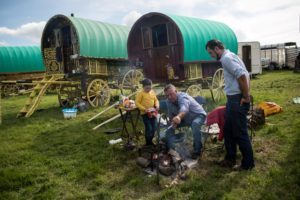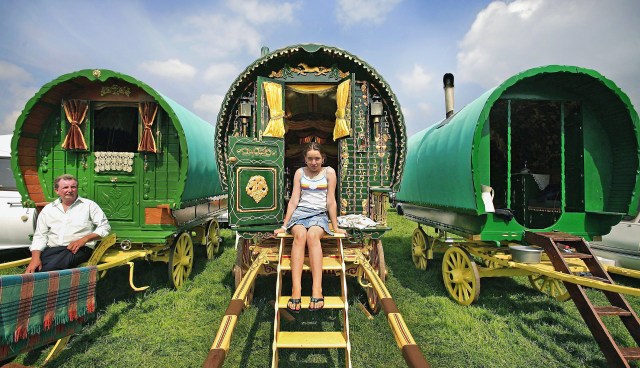Is the open road coming to an end? (Christopher Furlong/Getty Images)

Visitors to one of Cumbria’s largest and oldest cultural events are greeted long before it comes into sight. Hundreds of signs cable-tied to wooden stakes line the roads miles from Appleby-in-Westmorland telling the Gypsies, Roma and Travellers not to stop their vehicles on the way.
Adopting a belt-and-braces approach, the council placards feature not one but two silhouettes of caravans — the traditional bow-top variety and its modern successor — with red crosses struck through each. That is not to say that all of the incomers are ungrateful for the welcome. Some set up camp next to the posts, and use them for firewood.
In case the signs sprinkled around the town like confetti did not communicate the message, they are often punctuated by large boulders plonked on to verges. This year, one farmer went even further, spraying cow manure across his field and the public byway beside it.
The river in which the steeds of the Appleby Horse Fair are ritually washed may be called the Eden, but this market town — slap bang in the middle of the North Pennines, Lake District and Yorkshire Dales — has not quite been an idyllic paradise over the past week.
The fair, which has been taking place annually since 1775 and returned over the weekend for the first time since the pandemic, attracts an estimated 30,000 people (mostly tourists) to an area with a population of just 3,000.
Appleby is historically about buying and selling horses, some for up to £30,000. They are ridden into the river — watched eagerly by RSPCA officers — before being washed with Fairy liquid and groomed for market. Then they are raced down a section of road known as Flashing Lane (“flashing” means showing off a horse). Finally, the bartering takes place with a patter as breakneck as the galloping, before the sale is secured with a slap of the hand (in an era of Covid hygiene protocols, the time-honoured spitting on the palm appears to have fallen out of favour).

However, the largest Gypsy gathering in Britain, and perhaps the world, is about so much more than mares and stallions. With the majority of the pilgrims (of all varieties, from Romanies, who trace their history back to 11th century India, to English, Scottish, Welsh and Irish Travellers) now living in fixed accommodation, this is an annual chance to reconnect with their heritage and meet up with old friends and extended family.
They congregate over meals of bacon pudding (a steamed suet roly poly) or Joe Grey stew (a sausage and potato goulash). Many youngsters come here to meet their future spouses. The young women arrive dressed to the nines and freshly fake-tanned, marrying their ancient culture with a more modern, bling aesthetic. One older Romany tells me she calls them the “Oompa-Loompas”. She adds that this is the only chance she has to wear her gold earrings, traditional hairstyle and flowing skirts, as she hides her ethnicity from friends and colleagues.
“It’s literally sacred to us,” says Billy Welch, Britain’s Shera Rom, or Head Gypsy, as he walks around Fair Hill, the farm on which his people have camped for centuries. “Nowhere in the world do we feel welcome. Except here. This is our Jerusalem. This is our Mecca.”
But legislative clouds hang over these misty moors. The Police, Crime, Sentencing and Courts Bill, going through the House of Lords, would turn trespass, currently a civil matter, into a criminal offence. A person with a vehicle who resides or intends to reside on land without consent of the occupier; who has caused “or is likely to” cause significant damage, disruption or distress; and who refuses to move on when asked to by police could have their mobile home — containing all their possessions — seized, and face three months’ imprisonment or a fine of £2,500, or both.
Liberty has described the “potentially unlawful” proposals as “a direct attack on the way of life for many in these communities”, who could be rendered homeless. The Jewish Board of Deputies and Stand Up To Racism have also rallied to the cause.
Many fear the new law, covering England and Wales, could spell the end of Appleby, and therefore centuries of Gypsy culture, as some travel with their horses for up to 400 miles, from as far afield as Cornwall, making a journey lasting days or weeks. They need to rest on the side of the road and, with nowhere legal to stop, risk having their priceless hand-gilded “vardos” seized by police.
Labour peer Baroness Whitaker, who opposes the bill, will speak at its second reading. She tells me: “The Government justifies its trigger for this hostile action as the causation of ‘significant damage, disruption or distress’. But these are highly subjective terms, and given the widespread prejudice already evinced, open to cruel abuse.” She argues it is “clearly a discriminatory provision” that “looks suspiciously like a dog-whistle appeal to prejudice and racism”, adding: “We do not force other minority ethnic peoples to forgo their lifestyle.”
Strikingly, one Gypsy charity’s analysis of police forces’ submissions to the government consultation found 75% felt current powers were sufficient and 84% did not support criminalisation, while 65% said lack of site provision was the real problem.
But a Home Office spokesperson was resolute: “Unauthorised encampments can cause misery to those who live nearby, with excessive noise and littering, and people unable to access their land.”
Certainly a law that keeps the hordes away from Appleby would please some locals — who have to bear the cost of policing, road closures, toilets and rubbish clearance, and endure the inconvenience of their population growing tenfold over the course of a weekend.
After a public meeting in 2018, Cumbria’s police and crime commissioner Peter McCall, who said some residents felt “as if they had been invaded”, admitted: “At one point, I did say that if I had a magic wand I would ban it. But I went on to say that was not going to happen.” Many pubs and shops simply close for the duration, missing out on a boom in profits in favour of avoiding feared vandalism and disorder.

None of the locals opposing the fair — so vocal on Facebook groups and at town meetings — would speak on the record, presumably worried about being accused of bigotry. One local says that when Channel 5 made a 2019 documentary, with the understated title The Town The Gypsies Took Over, the only voice producers could find to give an extended criticism of the fair lived in a different town.
But one B&B owner in a neighbouring village tells me — anonymously — that she is “absolutely furious”. “It’s the only time of year we lock our doors,” she says. “It’s the ones who want to do what they want, where they want and not have to pay for it. Many shops close because of theft. I especially mind at the moment, when there have been so many restrictions on the rest of us.” Perhaps she is right to be angry; the number of arrests at this year’s fair was its highest in seven years.
To Britain’s estimated 500,000 Gypsies, Roma and Travellers (who have been in England since at least the 16th century), such opposition is nothing new. Read any official report on the communities and you will be struck by a catalogue of state-sponsored discrimination and stunted life chances.
Indeed, the Government admitted in 2019 that they “are among the most disadvantaged people in the country”. They have relatively low literacy rates and the worst school attainment of all ethnic groups. One in five Gypsy Traveller mothers will suffer the loss of a child, compared with one in 100 for the rest of the population. And their life expectancy is 10 to 12 years shorter than average.
Welch says the collective memory of the murder of an estimated 500,000 European Roma during the Holocaust — or Romani Porajmos — is “very fresh in our minds”. The reason Appleby is so central in the calendar, he says, is because so many other gatherings across the world have vanished. “The erosion of the other events is a result of these kinds of laws all over the world. In recent years, we’ve noticed a big rise in racism. But we’ve been here 500 years. We’re as British as anybody else.”
Hertfordshire-based Sherrie Smith, co-founder of the Drive to Survive campaign against the bill, knows all about the long tail of unwanted interventions into Gypsy life. Her family has lived in fixed accommodation since her grandmother was forced off a site in 1959.
But she says the proposed legislation “will affect us all – in hate, prejudice, the narrative. The government has failed us for decades, so why are they adding to it? There’s not a day you’re not treated differently, but it’s definitely worse now than it’s been, ever.”
Sitting in her hired caravan, Smith details a series of housing Catch-22s that she wants solved, instead of what she sees as an act of legislating her people’s nomadic culture out of existence. In January, there were reported to be 1,700 families on waiting lists for pitches on public Traveller sites, with 59 permanent pitches available. (A statutory duty to establish authorised sites was repealed in 1994.) And if a Gypsy, Roma or Traveller can afford to buy their own land and seeks planning permission, a social media campaign will begin, along with local politicians who “spit venom”.
“So, what do we do, then?” she asks with her hands in the air. “You’ve got no social housing.” Smith sees the proposals as a cheap piece of populism with chilling implications. “It’s cultural genocide. It’s forced assimilation.”
Meanwhile, over the clip-clop of passing hoofs, a group of pensioners sitting on the steps of a house overlooking the river say they enjoy the spectacle provided by “all the carry-on with the horses”.
A trio of women who volunteer at the Age Concern charity shop in the town centre are similarly unfussed. “They’re very friendly, the Gypsies,” says one. “It livens us up a little bit. You only hear people who are running them down.” Her colleague chips in: “It’s the one time of year when people in Appleby think they’re a lot better than everybody else. And in reality, everybody’s the same. It’s no worse than a bunch of people going to Blackpool.”
The first adds: “We’re perfectly happy, especially the people that’s lived here a long time. There’s a lot of new housing estates now. Really, they know the fair’s here every year and they still buy a house, but they twine like hell.”
The only thing she resents, she insists, is funding superfluous signage. “We’re paying for the council to go about putting posts everywhere.”










Join the discussion
Join like minded readers that support our journalism by becoming a paid subscriber
To join the discussion in the comments, become a paid subscriber.
Join like minded readers that support our journalism, read unlimited articles and enjoy other subscriber-only benefits.
Subscribe